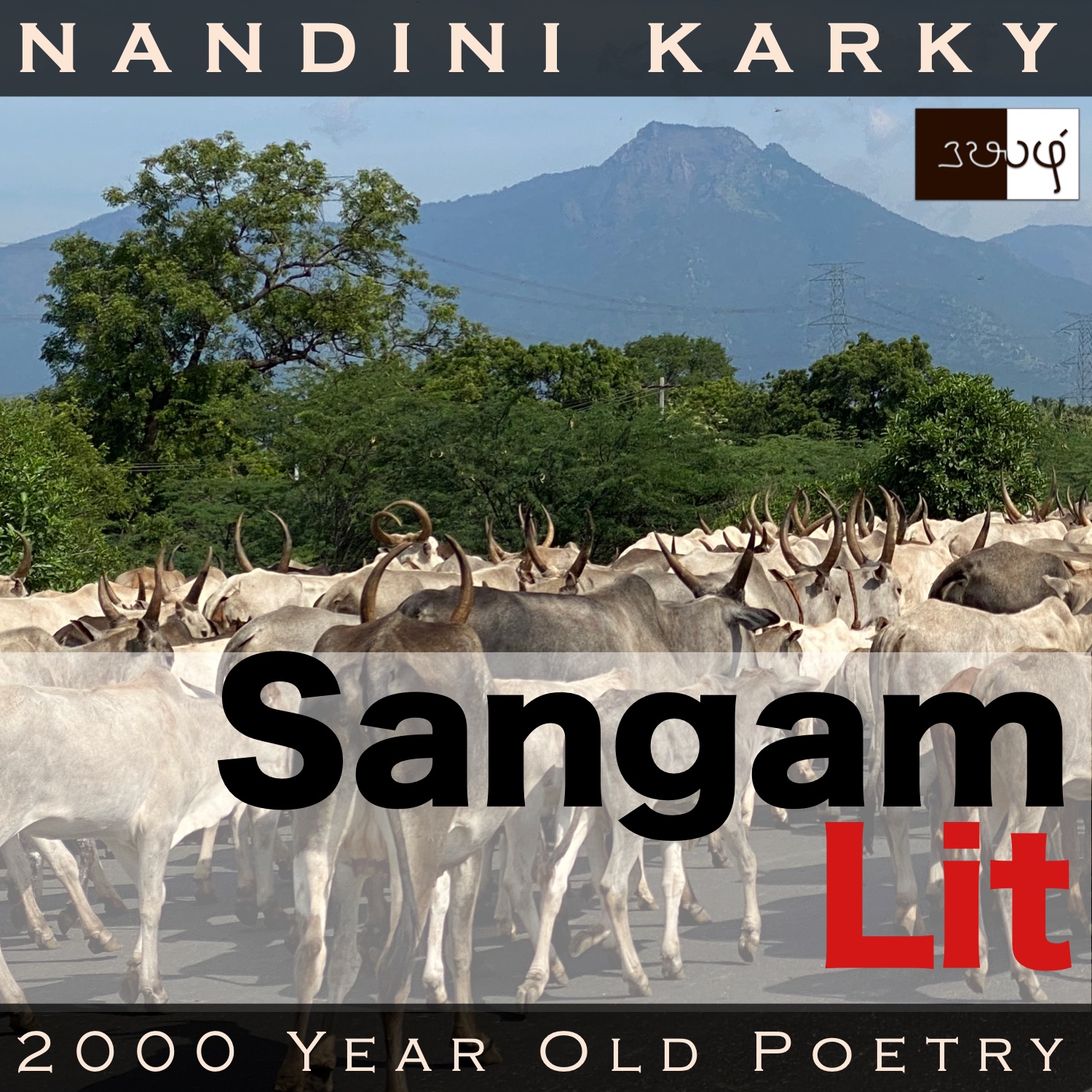Podcast: Play in new window | Download
Subscribe: Apple Podcasts | Spotify | Amazon Music | Android | iHeartRadio | TuneIn | RSS | More

In this episode, we perceive the outcome of negative feelings, as depicted in Sangam Literary work, Kurunthogai 80, penned by Avvaiyaar. Set in the farmlands of ‘Marutham’, the verse speaks in the voice of the courtesan, passing on a pointed message to the lady’s friends, listening nearby.
கூந்தல் ஆம்பல் முழு நெறி அடைச்சி,
பெரும் புனல் வந்த இருந் துறை விரும்பி,
யாம் அஃது அயர்கம் சேறும்; தான் அஃது
அஞ்சுவது உடையளாயின், வெம் போர்
நுகம் பட கடக்கும் பல் வேல் எழினி
முனை ஆன் பெரு நிரை போல,
கிளையொடு காக்க, தன் கொழுநன் மார்பே.
In the heart of this verse, beats of war and conflict echo aloud. The opening words, in contrast, dwell on beauty and speak about an aesthetic accessory in ‘கூந்தல் ஆம்பல்’ referring to ‘waterlilies on the tresses’. In ‘பெரும் புனல் வந்த இருந் துறை’ referring to ‘the huge shore, flooding with water’, we can see the fertile river shores of this agricultural land. From peaceful scenes in a farmland, the verse journeys to ‘வெம் போர்’ talking about ‘a fierce war’ and a historical character in ‘பல் வேல் எழினி’, ‘Ezhini, the wielder of spears many’. Curiously, in ‘முனை ஆன் பெரு நிரை’, we glimpse at ‘numerous herds of cattle in the battlefield’. Having associated cows with rustic villages, it’s hard to imagine what they are doing in a raging war zone. Ending with the words ‘தன் கொழுநன் மார்பே’ meaning ‘her husband’s chest’, the verse beckons us within the story.
What an odd combination in waterlilies, river shores, battles and cattle! The context reveals that the man and lady had been leading a married life when the man took to keeping the company of courtesans. Angered by this, the lady speaks ill of the courtesan and her words reach the courtesan’s ears. In response, when the lady’s friends are in earshot, the courtesan says aloud, “Wearing on the tresses, petite waterlilies with outer petals removed, I shall go and play in the desirable, huge river shore, with copious waters. If she has any fears about that, akin to how a huge herd of cattle were reclaimed by the many-speared ‘Ezhini’, who stood in the midst of a raging battle and conquered, along with her kith and kin, she can try and protect her husband’s fine chest!” With these words, the courtesan is passing on a hidden message to the lady that the man favours the courtesan and will do her bidding!
Sounds like what would be called a ‘cat fight’ in contemporary times! Starting her message with the image of adorning her hair with waterlilies, that too, one in which the outer petals have been clipped off, the courtesan reveals the importance that appearances play in her life. I was wondering about why the outer petals must be clipped and then realised that waterlilies were huge and wearing the whole flower may eclipse the wearer’s face and create a comic effect. To avoid that, perhaps the outer petals are cut and only a little bud is worn. Next, the courtesan reveals where she intends to go with those flowers in the head. She says it’s to the shore, where the river gushes with water, so as to play there. In that, is the hidden implication that the man too will come along and partake in that play. Then, from her intentions, the courtesan turns to the lady’s mind and says if the lady fears that so, she could try to guard her husband. In the message of how the lady may guard her husband, the courtesan narrates a historical incident in a battlefield, where king Ezhini, valiantly fought and protected his herds of cattle from being stolen by his foes.
To us, it may sound like the courtesan is offering sound advice to the lady but the core of her message is ‘I dare you!’ She seems to believe in the power she wields over the man and conveys to the lady that the lady can do nothing to prevent the man from being with her. Devious tactics indeed, to make the lady insecure about her relationship with the man! In these lines, the spotlight seems to shine on the negative shades of jealousy and anger and go on to show that the Sangam folks shy not from portraying the entirety of human experience, be it the good or the bad!




Share your thoughts...